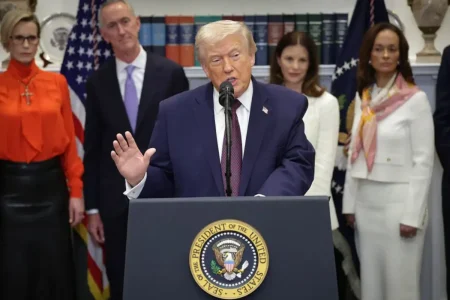Republicans United in Opposition: A Look at the Factors Beyond Rising Premiums
While Democrats have publicly focused on the threat of increasing Obamacare premiums as a rallying point, there’s a deeper story behind Republican unity in opposition. The president’s pattern of challenging established laws, breaking traditional political norms, and pushing against congressional limitations has served as a powerful force keeping Republicans aligned against administration policies. This tension extends beyond healthcare concerns, touching on fundamental questions about the balance of power in our government system and respect for institutional boundaries that have traditionally guided American politics.
The healthcare premium debate represents just the visible tip of a much larger iceberg of concerns for Republicans. When cameras are rolling and public statements are being made, Democrats frequently highlight potential premium increases under Republican proposals as their primary objection. However, behind closed doors and in more candid moments, many Republican lawmakers express deeper worries about what they view as executive overreach and disregard for constitutional constraints. This perspective has created a bond among legislators who might otherwise disagree on policy specifics but find common ground in their desire to maintain traditional governmental boundaries and congressional authority.
What’s particularly interesting about this dynamic is how it has bridged different factions within the Republican party. Establishment Republicans, fiscal conservatives, libertarian-leaning members, and even moderate Republicans who might otherwise support certain administration policies have found themselves united by concerns about presidential actions that appear to bypass or undermine legislative authority. This cohesion persists even when some members might privately agree with specific policy goals, because the methods being employed to achieve those goals raise red flags about precedent and long-term institutional damage. The president’s approach has inadvertently created a stronger opposition than the policies themselves might have generated.
The situation highlights an important but often overlooked aspect of American politics: process and norms matter deeply to lawmakers, sometimes even more than policy outcomes. When a president pushes the boundaries of executive authority through executive orders, agency directives, or public statements that challenge the legitimacy of other branches, it triggers defensive reactions across the political spectrum. For many Republicans, these actions represent not just disagreements on healthcare or other specific issues, but threats to the constitutional system they’ve sworn to uphold. This perspective transforms what might otherwise be routine policy disagreements into what they see as principled stands for constitutional governance.
This unity through opposition to presidential overreach has proven remarkably durable, withstanding multiple legislative battles and public pressure campaigns. While Democrats have attempted to focus public attention on potential negative outcomes of Republican healthcare proposals, particularly rising premiums that would affect voters directly, Republicans have remained primarily concerned with what they characterize as executive branch overreach. This difference in focus explains why public messaging from Democrats hasn’t succeeded in breaking Republican opposition – the two sides are fundamentally arguing about different things, with Democrats focusing on policy outcomes while Republicans focus on constitutional processes and presidential conduct.
Looking ahead, this dynamic suggests that resolving policy differences may require addressing the underlying concerns about presidential authority and respect for constitutional boundaries. Without addressing these deeper institutional concerns, even seemingly reasonable policy compromises may struggle to gain Republican support if they’re perceived as further enabling executive actions that bypass traditional checks and balances. The lesson here may be that in American politics, the “how” of governance can matter just as much as the “what” – and that lasting bipartisan solutions require not just agreement on policies, but agreement on the proper process for implementing them within our constitutional framework.










